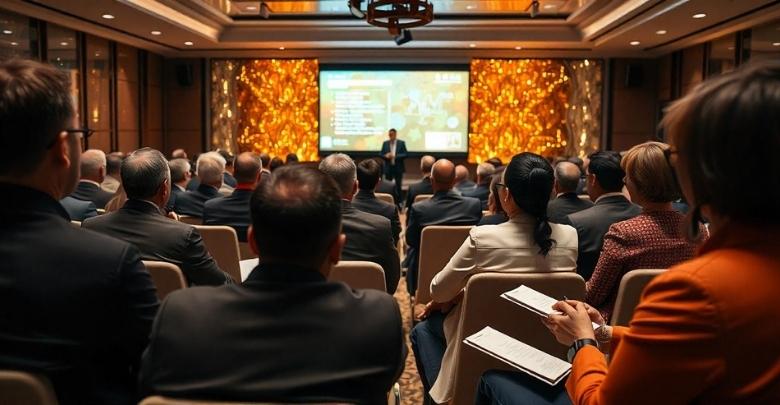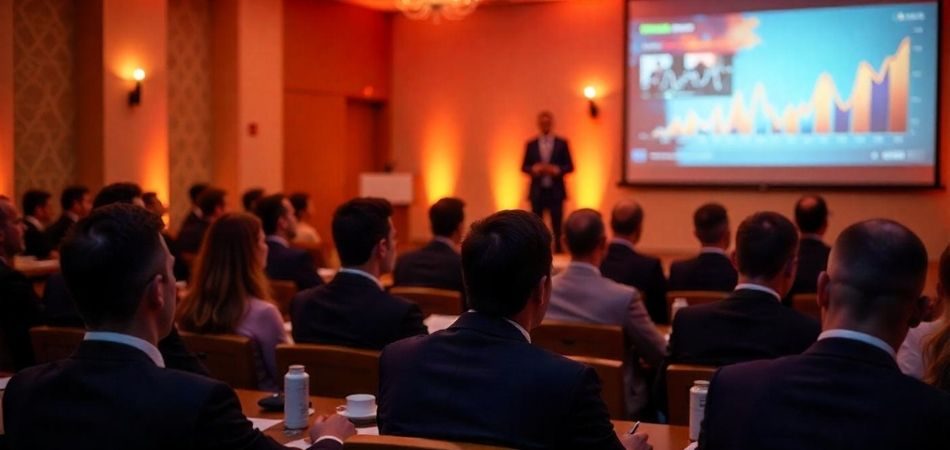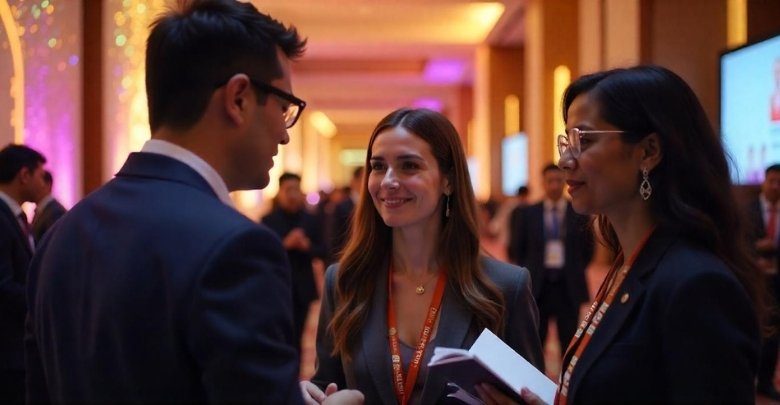Nowadays, economic conferences play a significant role in shaping discussions around economic theories and practices. They function as vital platforms for professionals to exchange ideas, network, and stay updated on the latest trends in the field. This brings us to the question, “Who should attend an economics conference?”
Individuals with a vested interest in economics should consider attending, including students, professionals, academics, researchers, and policymakers. These events not only offer valuable networking opportunities but also provide insights into current trends and a forum for sharing knowledge.
As you continue reading, you’ll discover the specific benefits and experiences that each group can gain from participating in an economics conference.
Economics Conferences- is It Evolving Day by Day?
Yes, economics conferences are evolving day by day, driven by the rapid changes and demands in the global economic field. These events have become more dynamic, now featuring interactive sessions, panel discussions, and hands-on workshops. Attendees gain real-time insights and practical skills, making conferences more relevant and engaging than ever.
In response to these developments, many conferences worldwide are adapting to include emerging economic trends. An upcoming economics conference in Canada will focus on topics like digital currencies and sustainable development. This broader, more current focus helps attendees address real-world issues within their professional and academic fields.
Moreover, technological advancements have also improved conference accessibility and interactivity, attracting diverse global audiences. Virtual and hybrid formats make it easier for professionals and students alike to participate fully. As a result, economics conferences are now more inclusive, helping attendees stay connected and informed.
Who Should Attend an Economics Conference?
A conference on economics is a valuable opportunity for anyone interested in economic trends, policy developments, and research results. These gatherings provide unique networking opportunities and develop discussions that drive economic insights. Here’s a look at who would benefit most from attending an economics conference:
Students Seeking Industry Exposure
Attending an economics conference gives students a better understanding of economic concepts beyond the classroom. It’s an excellent chance to connect with professionals and broaden their perspectives. Students can also learn about emerging trends and innovations in economics. This experience can help them decide on their career path within the field.
Professionals Expanding Their Network
Economics conferences are perfect for professionals looking to expand their network and stay informed on industry trends. Meeting experts and like-minded professionals can lead to collaborations and career growth. Professionals gain insights into best practices and innovative strategies within economics. These conferences support growth by keeping professionals connected to the latest economic developments.
Academics Presenting Their Research
Academics benefit greatly from attending and presenting at economics conferences, showcasing their research to a larger audience. This platform allows for feedback and constructive discussions to refine their work.
Academics can connect with peers working on similar economic topics or theories. Such interactions contribute to academic growth and development within economics.
Researchers Sharing Knowledge
Economics conferences offer a space for researchers to share findings and gain fresh perspectives on their work. This helps advance knowledge by promoting constructive dialogue and debate. Researchers can discuss challenges and solutions with other experts in the field. Networking opportunities can also lead to potential research collaborations.
Policymakers Seeking Economic Insights
Policymakers attend economic conferences to gain insights that inform effective economic policies. These events provide valuable data and expert perspectives on various economic issues. Engaging with economists helps policymakers address economic challenges in their work. Conferences help them make well-informed decisions that benefit society.
Entrepreneurs Exploring Economic Trends
Entrepreneurs benefit from attending economics conferences, as they gain insights into market trends and economic predictions. This knowledge helps them make better business decisions and anticipate changes. Economics conferences also allow entrepreneurs to network with experts and potential partners. These events are ideal for staying updated on economic shifts that impact businesses.
What are the Steps to Attend an Economics Conference?
Attending an economics conference can be a rewarding experience, but a few essential steps are needed to get started. From confirming the date to planning your travel, each step ensures a smooth experience. Here’s a simple, step-by-step guide to help you participate in an economics conference.
Step 1: Confirm Event Date and Location
To start, review the conference date and location to ensure it fits your schedule and travel abilities. Knowing the exact venue helps you plan for accommodations and travel logistics. You’ll also want to check if any sessions align with your interests. This early confirmation is key to efficient planning.
Step 2: Complete Your Registration
Once the details are confirmed, the next step is to complete the registration process through the official website. Registering early ensures your spot and often comes with discounted rates. You may need to submit details like your professional background or research topics. Completing registration well in advance is always recommended.
Step 3: Request an Invitation Letter
After registration, reach out for an official invitation letter if required, which validates your attendance. Many conferences provide this document for visa and professional purposes. The letter also serves as proof of purpose for immigration authorities. Make sure to request it promptly to avoid any delays.
Step 4: Apply for a Visa
With your invitation letter in hand, proceed with the visa application based on the conference location’s requirements. Carefully review and submit all needed documents for a successful application. Visa approval can take time, so start this process early. This step is crucial for international attendees.
Step 5: Plan Your Travel and Accommodations
Once your visa is confirmed, organize your travel and lodging arrangements well in advance for convenience. Book accommodations close to the venue to save travel time. Check for any conference-related discounts on flights or hotels. Planning early ensures a comfortable experience.
Step 6: Prepare to Participate Actively
With logistics handled, focus on preparing for active engagement during sessions, especially if giving a presentation at an economics conference. Review session topics and prepare questions or notes for meaningful interaction. Networking cards and presentation materials may also be helpful. Preparation raises your conference experience and maximizes the value of attendance.
Is Attending an Economics Conference Worthwhile?
Yes, attending an economics conference is worthwhile, offering valuable insights, networking opportunities, and exposure to current economic trends. Conferences bring together experts, providing a unique environment for learning beyond textbooks. Those attending gain practical knowledge that will enrich their academic and professional careers in economics.
Networking is another significant benefit of attending an economics conference, connecting you with professionals, academics, and students. These connections often lead to collaborations, mentorships, and future job opportunities. Meeting people with shared interests creates a strong professional network that extends beyond the conference.
Besides that, economics conferences provide opportunities to learn about emerging research and policy discussions firsthand. By listening to experts, you gain more insight into complex economic issues. This experience adds depth to your knowledge and keeps you informed about critical developments in the field.
Types of Economics Conferences Attendees Can Attend
Economics conferences offer attendees unique learning and networking opportunities in various fields. From policy-focused to academic conferences, each type has its benefits. Here’s a look at different types of economics conferences attendees can explore:
Academic Economics Conferences
Academic conferences focus on sharing research, theories, and recent findings in economics. They’re ideal for students, professors, and researchers presenting their studies. Discussions often revolve around advancements in economic thought and data analysis methods. Attendees gain insights and feedback that enhance their academic work.
Policy-Focused Economics Conferences
These conferences concentrate on policy-making and real-world applications in government and public sectors. Topics include economic policy impacts, regulatory frameworks, and social welfare programs. Policymakers and professionals discuss solutions to current economic challenges. Attendees leave with actionable ideas for shaping effective economic policies.
Business and Industry Economics Conferences
Business-oriented economics conferences address economic issues relevant to corporate growth, finance, and global markets. Topics include market trends, investment strategies, and economic forecasts. These conferences attract entrepreneurs, analysts, and business leaders looking for growth strategies. Attendees gain insights that support smarter business decisions and industry awareness.
International Economics Conferences
International conferences cover global economic issues, trade relations, and cross-border policies. They attract economists and policymakers from various countries to discuss international economics. Attending such events offers exposure to diverse perspectives and global trends. For instance, top economic conferences in Canada often include international participation and discussions on cross-border trade.
Student and Young Economist Conferences
These conferences focus on emerging economists, offering career guidance and foundational economic knowledge. Students and recent graduates engage in networking and skill-building activities. Sessions include workshops on economic research methods, data analysis, and career planning. Such events provide valuable exposure and connections for early-career economists.
Best Ways to Make The Most of Your Economics Conference Experience
You can grow your knowledge and network by engaging in an economics conference. However, maximizing the experience requires a little preparation and a proactive approach. Here are some of the best ways to make the most of your conference time.
- Set Clear Goals: Decide on specific goals you want to achieve during the conference. Having clear goals helps you focus on relevant sessions and connections.
- Plan Your Schedule Early: Review the conference agenda and prioritize sessions that align with your interests. A well-planned schedule ensures you don’t miss important discussions.
- Engage in Networking Opportunities: Introduce yourself to other attendees, including speakers and professionals. Networking helps build valuable connections that can benefit your career or studies.
- Prepare Questions for Speakers: Before sessions, think of questions related to the topics being discussed. Asking thoughtful questions shows engagement and often sparks interesting discussions.
- Take Detailed Notes: Jot down key points and insights during sessions to help you remember details. Good notes will be useful for future reference and sharing.
- Join Group Discussions: Participate in roundtables or breakout sessions whenever possible to exchange ideas. Group discussions boost understanding and broaden perspectives on various economic topics.
- Follow Up with New Contacts: After the conference, follow up with people you connected with to maintain relationships. Building professional connections requires consistent engagement beyond the event.
- Reflect and Review: After the conference, reflect on what you learned and achieved. Reviewing helps reinforce knowledge and identify any new goals or ideas.
FAQs About Who Should Attend an Economics Conference?
The purpose of economic conferences is to attract a wide range of people with an interest in economic theories, practices, and trends. Knowing who should attend can help potential participants make informed decisions. Here are some frequently asked questions regarding attendance at these vital events.
What Role Do Policymakers Play at Economics Conferences?
Policymakers attend economics conferences to gather insights that inform their decision-making processes. By engaging with economists and industry experts, they can gain valuable perspectives on economic challenges. These discussions help shape effective policies and programs, benefiting society and promoting economic growth.
What Types of Sessions Can Attendees Expect at an Economics Conference?
Attendees can expect a variety of sessions at an economics conference, including keynote speeches, panel discussions, and workshops. These sessions cover diverse topics, allowing participants to choose those that align with their interests. Engaging in these sessions promotes learning and provides insights into emerging trends.
How Do Economics Conferences Adapt to New Trends in the Field?
Economics conferences continuously adapt to new trends by incorporating current topics and innovative formats. Many now feature interactive sessions, hands-on workshops, and virtual options to accommodate diverse audiences. This adaptability ensures that attendees gain relevant knowledge and insights into the ever-evolving economic landscape.
How Can International Attendees Benefit from Economics Conferences?
International attendees benefit from economics conferences by gaining exposure to global economic trends and practices. They can share their unique perspectives and experiences, enriching discussions. Additionally, these events offer networking opportunities that can lead to cross-border collaborations and partnerships.
What Types of Economic Theories Are Typically Discussed at Conferences?
Economic theories discussed at conferences vary widely, including classical, Keynesian, and behavioral economics. Topics may cover microeconomic and macroeconomic principles, as well as contemporary theories addressing digital currencies and globalization. This diversity allows attendees to explore a range of economic concepts and applications.
Bottom Line
People interested in economics should take advantage of the opportunity to attend an economics conference. According to the article “Who should attend an economics conference?” all students, professionals, academics, researchers, and policymakers can greatly benefit from attending economic conferences. Each group gains unique insights, expands their networks, and expands their knowledge of current economic trends.
Students can explore career paths, while professionals can connect with peers to drive collaboration. Academics and researchers have a platform to share their work and receive feedback. Policymakers gain essential insights to inform effective decision-making. These conferences foster an engaging environment that promotes growth, learning, and the sharing of ideas among diverse attendees in the economics community.








